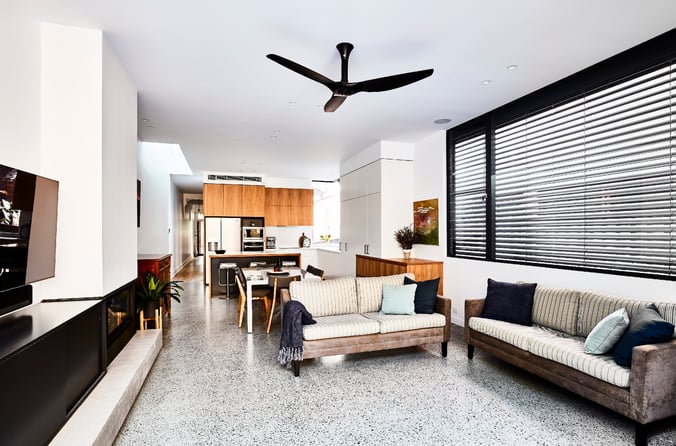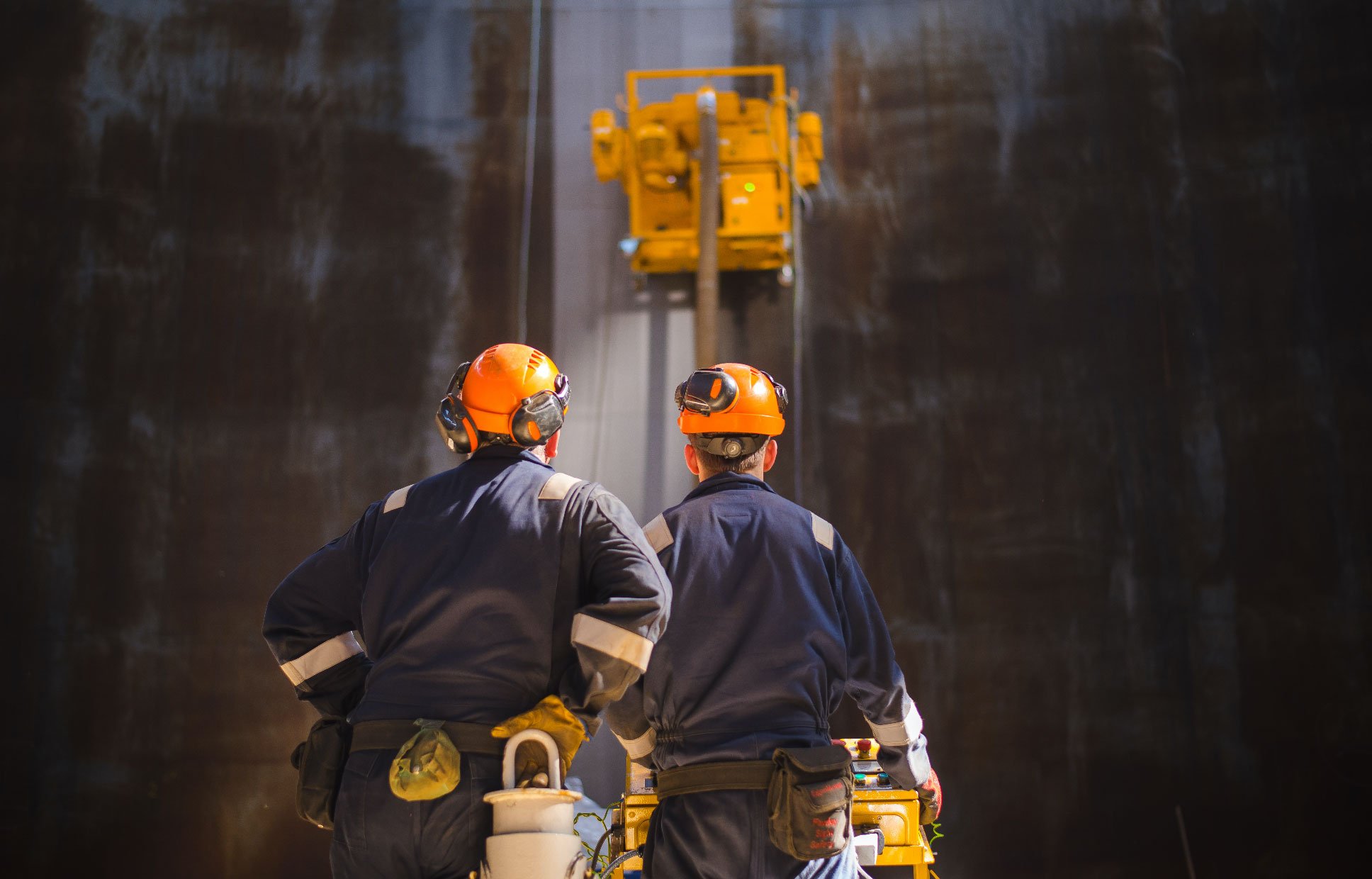
Polished concrete floors in residential applications are becoming really popular, especially in higher-end homes. Homeowners see this option and are attracted to the beautiful clean look.
However, once the initial attraction wears off there can be some serious questions in a homeowner's mind. They'll think, "Yes, they look awesome but is polished concrete a surface I can live with? Is it cold, slippery, hard on the feet, what’s the maintenance?" Just to name a few concerns.
In this article, we will address the main questions homeowners have about residential polished concrete as well as the Pros & Cons of polished concrete floors.
COMMON QUESTIONS
Are concrete floors SLIPPERY?
They can be! Most hard surfaces like ceramic, hardwood, marble, and laminate can be slippery when wet. With polished concrete, you do have the option of adding non-slip material to the sealer giving it a slip-resistant surface.
Generally, a polished floor that is kept clean and dry is not a problem. In fact, polished concrete is often more slip-resistant than waxed linoleum, VCT, marble, or—believe it or not—even just plain concrete!
Are polished concrete floors LOUD?
YUP, they are. And they can produce an echo as well. But that's true for every other hard-surface floor out there from ceramic tile, stone, VCT, hardwood, and bamboo. But, the loudness and echoes can easily be muffled with materials that absorb sound like wall fabrics, throw-rugs, pillows, and curtains.
Are polished concrete floors COLD?
Yes, they can be cold as well. (Again, just like all other hard surfaces). But here are a couple thoughts about cold concrete.
First, if we are talking about new construction, you have an awesome option when placing the concrete. You can install Radiant Heating. This is a system where piping is installed into the wet concrete and hot liquid is passed through the slab warming it up to a comfortable temperature and heats not only the slab but the whole house! This makes the slab really comfortable.
Another point is when the slab has direct sunlight it will warm throughout the day and slowly radiate the heat through the night. And again, area rugs will help a great deal in countering a cold floor.
Are polished concrete floors HARD on your feet?
No, polished concrete is very smooth so it is not abrasive on your feet. Polished concrete is HARD though. (I’m thinking you already know this). This hardness again can be mitigated to a great deal with area rugs. Remember, it is the concrete’s hardness that contributes to its durability, low maintenance, and abrasion resistance.
Can they be moist or DAMP?
Almost always NO, but in old buildings, below-grade floors that have no moisture barrier, and sites that were not properly prepared for the concrete, yes they can be.
But—and this is important—if you have a slab with those problems, you sure do NOT want to install anything like VCT, sheet vinyl or LVT over it because they tend to prevent the moisture from slowly wicking out of the slab and will create even more problems like mold, trapped water and mastic failure. These issues are much worse than a somewhat damp concrete slab. In fact, you are probably better off with a polished concrete slab as it allows moisture to escape the slab naturally.
Fortunately, by far the majority of slabs have moisture barriers installed under the slab making the amount of moisture migrating out of the slab not an issue for polished concrete.
Are polished concrete floors prone to CRACKING?
Yes, they are. Just about every concrete floor has cracks. Cracks are part of the aesthetic of polished concrete and are NOT an imperfection. Most people really like the rustic, natural look of cracks. If you honor the cracking, emphasize them with stains or dyes, they become part of the unique, individual personality of the slab. If you are looking for a solid, uniform slab with no cracks you must pour an overlayment over the slab and polish that. Even then, because of the nature of concrete and all the variables making each slab unique, most contractors do not guarantee that there will be no cracks or crazing in their overlayments.
One thing you should keep in mind when thinking about cracks in existing concrete floors is that there will most likely be other imperfections in the floor that can be patched but will not go away when polished. like old mastic stains, tile ghosting, chips in the concrete where carpet tackstrip was removed....but to many homeowners, these imperfections are seen as just the character of the floor and are perfectly acceptable.
Is polished concrete maintenance-FREE?
No, it is not entirely maintenance-free. It is however very LOW maintenance, depending on the traffic. In a home environment with normal foot traffic, just mopping with the correct cleaner is all that is necessary for many years of use. Compared to other forms of flooring options polished concrete has far less maintenance.
How PET-friendly are polished concrete floors?
Yes, they are very pet friendly, in fact, polished concrete is probably the most pet-friendly flooring option available, considering how scratch resistant the surface is as well as how easy it is to clean the surface.
One point to keep in mind though is to clean messes up (especially urine) immediately to keep the possibility of staining the surface and smell down. It is important to remember that “densification” is a critical part of polishing concrete and this makes a temporary barrier to liquid that gives time for cleanup compared to basic unpolished concrete that is very porous and allows liquid to easily penetrate the concrete causing more problems.
How will polished concrete affect the VALUE of my home?
When you consider the durability, long lifespan, ease of maintenance, and finish options versus other flooring options, the value of polished concrete becomes clear. Along with its aesthetic value and its super cool trendiness, it is a real positive for your home value.
Here is another good point, if in the future polished concrete becomes out of date—“that floor is SO 2020’s”—then you can simply carpet it, tile it, install wood flooring, whatever is appropriate at the time... at the end of the day it’s just concrete.
Are polished concrete floors EXPENSIVE?
Overall, if you look at the cost over say, 20 years, the cost is very low. Here are some facts to consider
- Initial cost compared to other high-end finishes marble, stone, some hardwoods, it is an economical alternative.
- Initial cost compared to traditional flooring options like carpet, linoleum, tile; yes it is more expensive for sure.
But over a 20-year span, it is the least expensive option you have. The reason is once you are done, it is good basically forever. Just minor maintenance is all that is necessary. In comparison, if you carpeted the floor, you will probably replace that flooring twice in that time span.
Are polished concrete floors ECO-FRIENDLY?
This one is SO easy. The answer is a great big YES! it is far more Eco-Friendly than ANY other flooring option. The reason is this,
-
you are manufacturing nothing.
-
there is nothing to throw away or wear out and replace. You are just changing what is already there.
-
yes, you do put densifier (a chemical) on the floor as part of the polishing process but even those chemicals are naturally occurring substances like Sodium & Lithium.
So, if choosing an eco-friendly flooring option is important to you, polished concrete is a great option.
Last question, can I polish concrete myself? Is it A DIY project?
This answer is easy as well, NO! While you theoretically can, please don’t, for a number of reasons. First, die and saw joints are both permanent, and so are mistakes made when applying them.
Also, concrete polishing is a very technical process and is best performed by a contractor with skill and experience. There are so many variations of concrete, including hardness and local conditions that even the handiest of homeowners just won't generally have the knowledge necessary to produce an acceptable finish.
Also, the equipment, power requirements and tooling vary a great deal. So, this is one project to leave in the hands of the pros.
So, those are the pros & cons, as well as the most common questions that people have about polishing concrete in a residential application. When you think about it, all things considered, polished concrete is worth considering, it’s a great option for your home.


 By
By